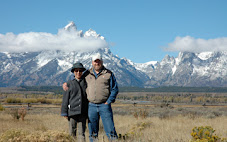Because you’ve indicated in the questionnaire that you’re interested in many styles or subject matter, it’s not clear where you intend to go with your imagery, so I hope these comments are somewhat helpful, if only to show you how someone else puts language to your work. Thanks again for sharing and I wish you well in your visual explorations.
(Note: His review also included advice on marketing photos, some creative devices to try and some photographers to check out.)
Great
use of the super-wide, fisheye lens, although I find it odd that the camel’s
feet are in focus but the grass is not, particularly on the left side. And then
there’s that tuft of grass around the front right hoof… Some post-processing
here to help make the animal pop out? If so, I think you need to blend the
focus fall-off more smoothly as this looks fake. Anyway, a nice composition
with the head, eye and teeth against a sparse plain. The complementary mood and
color sets a nice tone.
My
eye is drawn to the tree trunk first and it’s a little blown out on my monitor.
With nothing there as a pay-off, I next settle on the burst of color in the red
and green leaves. Nice quiet composition, great light, and subtle beauty. The
curves of the trunks in the lower right really appeal to me, along with the
understated initials carved in the opposite trees. A quiet scene worth
investigating.
One of my favorite types of photographs is the winter
landscape with bright colors against blue skies and clouds. Lovely pop of color
although it appears a bit enhanced compared to the shaded red rocks in the
middle background. Otherwise a classic composition and lighting. Probably would
make a great poster or large print to command someone’s living room wall.
(Note: The colors in this January shot were a bit dull, so I boosted the orange and blue in ColorEfex to be closer to a deep sunset shot I had taken in October.)
One
of your more interesting shots to my eye: The way the blurred branches and
leaves paint a swath of color around the focal point, and the leading lines and
balance of the Japanese (?) bell in the background all work beautifully. The
texture of the roof lines also complements the texture of the branch/leaf lines
too.
(Note: I touched up some blown-out spots on a couple of leaves in Photoshop, but this is otherwise as shot.)
Ah,
dreamy landscape conquered by man’s creations. Your compositions are
classically strong with visual centers following the rule of thirds. Nice pop of
color here, and the turbines help make it all feel “modern.” I wish there were
a bit more drama with the lone train engine as the scene is a bit static, but
that’s another nitpick.
This shot would be a great illustration in a magazine for oil
rigs and/or farming. Unlike the train shot I just mentioned, the blurred motion
of the oil rig against the sunset is what makes the shot, along with the clouds
and overall silhouette. The negative space on top is perfect for headline, dek
and other magazine dressings.
This shot unfortunately appears almost totally blown out on
my monitor. I can see your classic composition at work, however, and the
tranquility of the scene. Hard to say anything about the mood given the almost
white scene, unfortunately.
Image number eight is a well-framed snapshot. If you were to
consider something like it for stock sales, you would probably need morning or
afternoon light, and the goat would need to be doing something besides resting;
something interactive with something in the environment.
The
piano tuner is another classically composed shot, straight-forward and literal.
I would prefer more separation between the lamp in the background and the man’s
head. Light is flattering and the backlight a nice way of adding some drama to
the scene. This is a competent newspaper feature story kind of photo. I am
indifferent to the color toning you’ve chosen.
A
clean sports photo but lacking in drama or tension: an editor once told me a good
sports shot has two faces and a ball. Well, cycling lacks the ball aspect but
regardless it’s one of the more difficult sports to photograph if one seeks to
capture the energy and motion that is cycling (spoken as a cyclist). What’s
missing here is more context to give the rider an environment that suggests his
story. Perhaps that is the thing I could suggest you think about as you
improve: how to see elements in your framing that suggest a story or a
relationship. Your technical skills with static (non-moving) subjects don’t
seem to be lacking, so finding ways of seeing that involve the visual subject
with its foreground/background might be a challenge that would interest you.\
Postscript: I sent an email to PopPhoto thanking them for the fine review. They asked if they could quote me in an upcoming ad and email blast. I said, Sure. Today I (and thousands of others) received this:


















